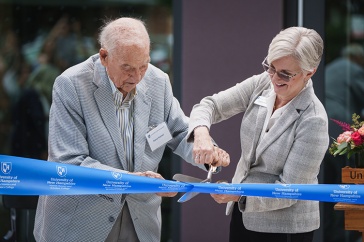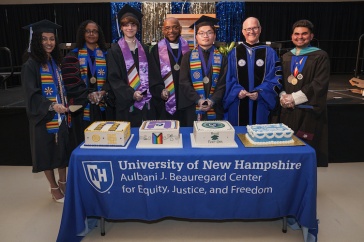The University of New Hampshire Police Department has been reaccredited by the Commission on Accreditation for Law Enforcement Agencies (CALEA).
That accreditation means the department is “part of an elite group” of law enforcement agencies from across the country, according to UNH Police Chief Paul H. Dean.

CALEA is an independent nonprofit established in 1979 that serves as a credentialing authority on American law enforcement agencies. Police departments can renew accreditation every three years, and this is the fourth time UNH Police has received a CALEA accreditation since it was first credentialed 12 years ago, Dean says.
“It means that we meet the highest industry standards in the U.S. for public safety,” Dean says. “Roughly only 5 percent of law enforcement agencies are accredited, so we’re very proud to be part of an elite group of agencies.”
CALEA’s standards include requiring law enforcement agencies to develop transparent policies, promote accountability within the community and the law enforcement agency, establish best practices and strengthen ties with the community.
According to Dean, that means UNH’s police department is “doing things the right way, and we can show we’re doing things the right way and using best practices every day.”
The department “continues to strive for perfection in all areas of CALEA accreditation,” says Christopher D. Clement, UNH’s vice president for finance and administration. “The CALEA group of commissioners expressed praise for the entire department for its continued diligence and focus on meeting the stringent national standards in campus security accreditation.”
Accreditation is an ongoing process: Allison Jean, the department’s accreditation manager, works to keep policies up to date and in line with CALEA standards, state law and the latest policing practices.
For the department’s latest accreditation renewal, Dean says a team of CALEA assessors visited campus and interviewed department staff and community members. The team was particularly impressed with the level of support the department has from the community and its efforts to attract a diverse staff.
“We know that one of our challenges is having a diversified workforce, so last year, I engaged students in the Paul College marketing department to help me develop marketing and recruitment plans,” Dean says. CALEA “was very impressed with that. We believe that we’re just as integral to the community as anyone else, and we want our department to reflect the community.”
The department is also accredited by the International Association of Campus Law Enforcement Administrators.
“That means we have to meet additional standards that are campus-specific, from blue-light safety phones to compliance with Title IX and the Clery Act. It’s a very high bar to meet,” Dean says.
Accreditation means students, the UNH community and the greater Durham community know the department is held to a high standard.
“Everyone wants to know that their police department is professional, that they’re accountable for their actions and a part of the community,” Dean says. “That’s what people can take from accreditation — that they can feel confidence in their law enforcement agency.”
-
Written By:
Larry Clow '12G | UNH Cooperative Extension
















































